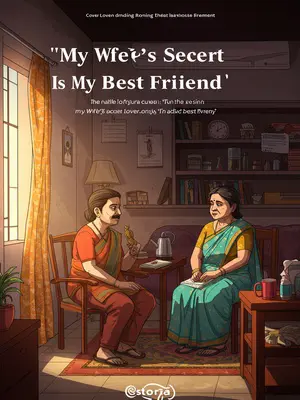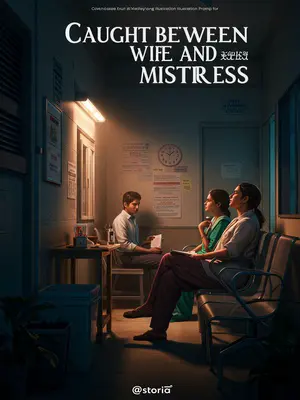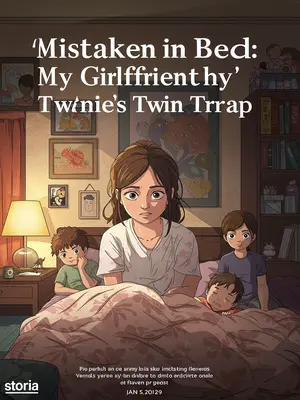Chapter 2: The Price of Dignity
I swear, I did nothing!
The very idea left a sour taste in my mouth.
So the next morning, Kabir woke up sprawled on the cold floor.
At breakfast, Kabir massaged his temples and announced, "From now on, I’ll give you the respect you deserve. But don’t expect anything more."
He said it as casually as if he was telling the bai what sabzi to make for dinner. Even the maid pouring chai couldn’t hide her smile behind the kettle.
On the day I returned to my parents’ home—
Whatever dignity I had vanished with a single request from Ananya, who simply wanted to see the mango blossoms on Kaveripur Hill.
I walked into the Sharma house alone.
My father’s face was stormy, and my stepmother’s attempts at comfort only made things worse.
"Having a daughter like you is a blot on the Sharma family name," she lamented, twisting her pallu with dramatic flair, as if the more she wrung it, the deeper my shame.
My father barked at the servants to drag me to the puja room.
But before anyone could touch me, I folded my hands and sat on my haunches, the way I’d done since childhood when summoned for scoldings. The flicker of diyas, the heavy scent of incense, my father’s slippers slapping against the marble, and the muffled bhajans from the radio filled the air with tense domesticity.
He raised his cane, but didn’t strike. After all, I was now a married woman—a member of the Kabir family. He could no longer lay a hand on me.
In the end, he flung his shawl dramatically and stormed out.
Looking back, maybe this marriage wasn’t so bad after all.
Kabir was the only son of his family—distant, untouchable, like the moon among stars.
Sure, people would gossip about me marrying him, but—
Running a household with an army of helpers and a husband who never interfered? Not a bad life!
My chachi always said, "Bahu, a silent husband is the best blessing. No interference, no tamasha!" Never thought I’d actually get that.
But no matter how much I tried to be modern and open-minded, sometimes, I couldn’t help feeling irritated—
Especially when Ananya stirred up trouble!
I had always known my place in this story—
The legitimate daughter of a fifth-rank officer, educated and proper, but only ever a foil to set off the heroine’s sparkle.
I was the extra diya at Diwali, always burning but never noticed.
But even after the main drama ended, the heroine gave me a starring role in her own way.
Once, I’d given a starving Ananya a box of laddoos.
To her, the sweets I’d grown bored of were a delicacy she’d never tasted.
But let’s be honest—my mithai didn’t change her life. The real magic was in the men who came after!
Readers called me fake-kind, a shadow to Ananya’s real charity. She’d rob the rich to help the poor, right wrongs, and always find herself in the thick of trouble—
Luckily, she had the most powerful men to bail her out!
It wasn’t just Yashvardhan—Kabir was always there too, picking up the pieces.
Ananya wore the Kabir family’s gold chain—show that chain, and anyone would bend over backward to help.
The money Kabir’s family shelled out to fix her messes was more than Ananya ever handed out herself.
All her big promises—doctor’s help, lost relatives found—were fulfilled by Kabir!
And most of the time, Kabir was running after Ananya, not me!
So, all the leftover chores landed in my lap.
It wasn’t my job—I could’ve just handed over some money and shut the door.
But when a desperate father carrying his sick wife, or a mother searching for her missing daughter, looked at me with hope, how could I turn them away?
Maybe I was a hypocrite.
So, when I saw that little girl begging with a broken leg, I tossed a box of laddoos—meant for the Governor’s wife—out the car window, hoping nobody noticed.
That’s how I ended up here!
Bad luck, that’s all.
I was always busy, rarely at the Kabir residence.
One night, under the pale moon, I slipped home. Kabir was drying his hair with a towel, reading a travelogue. By the flicker of tube light, his eyes looked impossibly deep.
A koel sang somewhere in the neem tree. The room smelled faintly of soap and old wood—so familiar, so homely.
He glanced up at me, eyes unreadable, then returned to his book. We shared a room, but lived like strangers.
Truly, sharing the same bed, dreaming different dreams.
Sometimes, I’d laugh to myself—only Ananya could have arranged such a perfectly imperfect marriage. Even Ekta Kapoor would be impressed by this plot twist.













